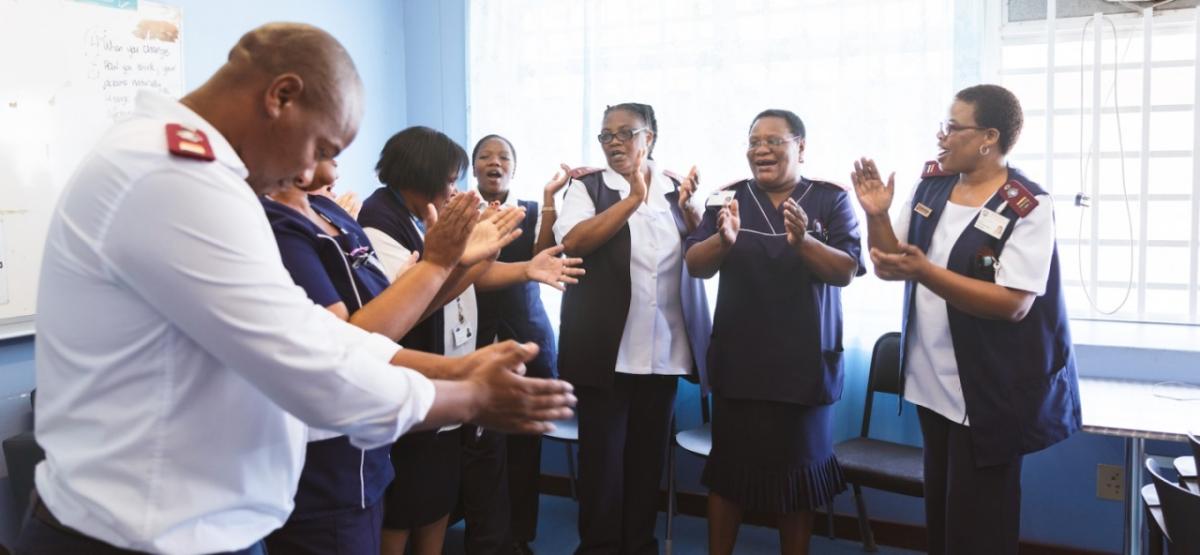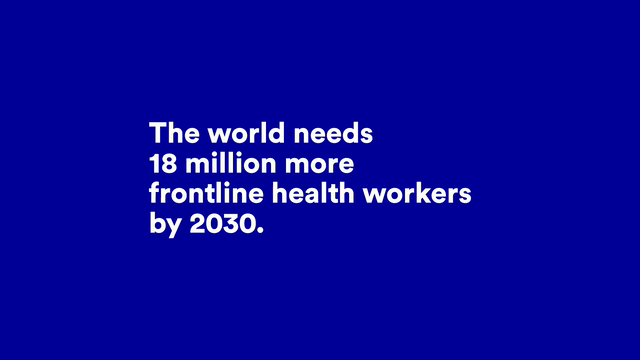At Davos 2020, Johnson & Johnson Steps Up Case for Investing in Frontline Health Workers With $250 Million Commitment
Originally published on jnj.com
At the World Economic Forum Annual Meeting in Davos, Johnson & Johnson announced a $250 million commitment to frontline health workers through the company's recently established Center for Health Worker Innovation.
As the world counts down the “decade of action” to make the 2030 Sustainable Development Goals a reality, Johnson & Johnson is taking one of the toughest challenges facing healthcare head on—closing a 18 million health worker shortage and equipping all frontline health workers to thrive. Solving this challenge is critical to achieving global health priorities such as universal health coverage.
Declaring 2020 the Year of the Nurse and Midwife, the World Health Organization is bringing renewed attention to the pivotal role frontline health workers play in providing essential health services. Nurses and midwives, alongside community health workers, are often the first and only link for communities to their health systems. Without access to quality care, 8 million people die each year in low- and middle-income countries.By founding the Center for Health Worker Innovation, Johnson & Johnson is stepping up its century-long commitment to health workers by responding not only to the looming health workforce crisis but also the current gap in skilled care faced by millions.
Accelerating Action Across Sectors to Build a More Resilient Global Health Workforce
By 2030, the Center for Health Worker Innovation intends to support one million nurses, midwives and community health workers and strengthen health systems in 10 regions across five continents, to improve the quality of care for an estimated 100 million people.
To that end, the Center will focus on supporting effective, innovative and scalable interventions to ensure that those on the front lines of care are competent, confident and connected.
The Center launched its first regional intervention hub in partnership with the Government of Kenya, co-creating the Community Health Units for Universal Health Coverage Platform (CHU4UHC) to integrate community health workers formally into the health system. Recognizing the role of community health workers in delivering preventive and promotive healthcare, CHU4UHC is a key strategy towards achieving the country’s ambitious goal of achieving universal health coverage by 2022.
The Johnson & Johnson Impact Ventures (JNJIV), an innovative finance initiative with the Johnson & Johnson Foundation to address the existing gap in health-focused impact investing, supports social enterprises within the Johnson & Johnson Center for Health Worker Innovation. To date, JNJIV has committed $6 million to eight impact investments in Kenya and aims to build a global portfolio of up to 15 investments over the next two years.
Johnson & Johnson, along with industry peers and the Bill & Melinda Gates Foundation, has united behind an $18 million pledge to accelerate digital tools to train health workers through the Health Worker Training Initiative. This public-private partnership seeks to increase access to community-based primary healthcare for nearly 1.7 million people in up to six African countries, as part of their shared commitment to accelerate universal health coverage.
These are some of the high-promising new interventions driven by the Center for Health Worker Innovation that puts the health worker at the heart of building a more resilient global workforce.
The work of the Center builds upon the success of programs pioneered by Johnson & Johnson such as MomConnect in South Africa, a maternal health platform in partnership with the National Department of Health. In five years, MomConnect has reached 95% of the country’s clinics and health facilities, connecting more than 2.7 million pregnant women and new mothers to timely health information using mobile phone technology. NurseConnect, an extension of this platform, connects frontline health workers to their peers, supervisors, communities and the health system.
The vital role of health workers in meeting the needs and opportunities of health systems was driven home during the panel discussion, “Accelerating Good Health for All: Why a Health Worker First Lens Delivers,” convened by Johnson & Johnson at Davos. Luminaries from UNICEF, Amref Health Africa, International Rescue Committee and Save the Children joined Lauren Moore, Vice President, Global Community Impact at Johnson & Johnson in voicing how critically important it is to invest in health workers.
“The Johnson & Johnson Center for Health Worker Innovation is an enterprise-wide effort to inspire, recruit, train, retain, and mobilize frontline health workers,” said Moore. “We believe if we solve the challenges facing health workers, we can truly solve the toughest health challenges of our time and improve healthcare for everyone.”



